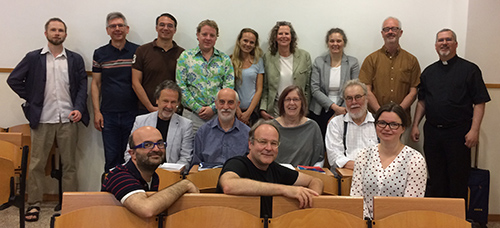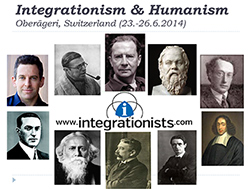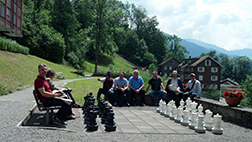This is the website of the the international association for the integrational study of language and communication. More...
Integrationism is a new development in the theory of communication that has far-reaching implications for many social, political, legal, philosophical and psychological issues of our time. It offers a radical departure from traditional Western assumptions about language and communication. More...
Call for papers for 2020 conference
Integrationism and Language Ideologies
Federal University of Santa Catarina, Brazil, September 1-2, 2020
Forthcoming conference
Pennsylvania State University, Aug 30 - Sep 2, 2019
The main objective of the annual Integrational Linguistics conference is to systematically explore the nature of the overlap and the disjunctures between core ideas about Integrationism and certain philosophies of language, including Socio-Cultural Theory, Critical Discourse Theory, Identity, Translanguaging, and Systemic Functional Theory, as well as Colonial and Postcolonial Theory.
Attention Graduate Students from all disciplines
Interested in learning more about Integrationist Linguistics?
You are invited to attend a special pre-conference series of free workshops led by renowned global scholars on Friday & Saturday August 30-31, 2019. This includes:
Dorthe Duncker
The workshop is about how integrational linguistics can be applied in practice.
Integrationism invites you to think about your everyday communicational experience, as well as your practice as a professional linguist, in a different way. Integrational linguistics privileges the “first person” perspective, the perspective of the individual communicating agent, and this perspective also defines the perspective of the investigative linguist. It is impossible to leave or to step outside of language in order to study language. Linguistics is in itself a linguistic exercise, and all communicating participants are uniquely situated in time and space. This linguistic reflexivity conditions our lives as communicating participants, and without it linguistics would not be possible. The integrational mindset requires you to think about things you take for granted and to rethink inveterate academic habits. In a sense, you become attentive to your usual inattentiveness, and in return you will realize that no linguistic methodology can be neutral or innocent. For this reason, the notion of “linguistic data” needs to be radically reconsidered for it to be compatible with integrational principles. In the workshop, you will get to have hands-on experience with the challenges an integrational approach poses to the study of linguistic phenomena.
Adrian Pablé
In this workshop I will be discussing different theoretical models of how words are supposed to mean and the beliefs underlying these models.
Drawing on practical examples, we will explore how linguistic beliefs shape communicational activities involving the establishment of ‘reference’ in different domains (e.g. science), which are questions about the ontology of things and how we gain knowledge of them. Against the background of how particular traditions of philosophy and linguistics have approached the issue of 'reference', I will introduce participants to the tenets of an integrational semiology and epistemology based on my own fieldwork on names and discuss how decontextualized analyses of relations between ‘words and things’ mislead our thinking about the status and function of 'names'. Furthermore we will look into Roy Harris’s notion of 'glossing practice' with particular reference to the metalinguistic questions 'What's the name of object x?' and 'What does name x refer to?' and invite participants to imagine situations in which we are called upon to establish reference as a practical communicational activity. In this way, we will be able to highlight the importance of personal linguistic experience as the point of departure for the integrational linguist.
Peter Jones
What we typically experience in face-to-face communication’, as Roy Harris put it, ‘is the temporal development of a single integrated continuum, to which signs of various kinds contribute.’
In this workshop we explore the value of integrationist insights for reflecting on our experiences and observations of a practical task involving face-to-face communication to be carried out during the workshop session. The task requires small groups of participants to cooperate towards a set goal and to endeavour to improve their performance over repeated trials. Of particular interest will be the ways in which participants jointly make of the task activity ‘a single integrated continuum’ through the spontaneous creation and continual transformation in real time of the communicational dimensions of their cooperative relationship.
Full details including registration
Recent conference

New Directions in Philosophy of Language and Linguistics
An international conference sponsored by the IAISLC to mark the 20th anniversary of the association. Held in Rome at Pontifical Lateran University June 4-5, 2018
Recent publications
See Publications page.
There is also a free preview of the first couple of chapters of Critical Humanist Perspectives at Google Books.
2015 A. Pablé and C. Hutton, Signs, Meaning and Experience. Integrational Approaches to Linguistics and Semiotics
(= Semiotics, Communication and Cognition 15), Berlin: Mouton De Gruyter. xvii + 180pp. Also available at Amazon
2015 D. Bade, R. Harris, C. Conrad (Compilers) Roy Harris and Integrational Semiology 1956-2015: A bibliography
Recent colloquiums
Philosophies of Communication: East and West
February 2-3, 2018
School of English, The University of Hong Kong
The School of English, University of Hong Kong held the second International Colloquium on Integrational Linguistics entitled Language, Mind & Society: Semiological Perspectives at HKU on 2nd & 3rd December 2016. Details...
Previous conferences
Integrational Approaches to Teaching and Education
October 22- 25, 2015, in Dubai, UAE
June 23-26, 2014
In recent years intellectuals and educators have called for a new humanism based on rationality, secularism, and scientific knowledge. The university curricula and schools thus conceived are to enable their students to become responsible citizens as well as independent critical thinkers.
This conference explored the (present-day) concept of humanism and its concomitant models of 'the human' from an integrational perspective.
Other publications
Linguistics Out of Bounds: Explorations in Integrational Linguistics in Honour of Roy Harris on his 80th Birthday
Language Sciences, Volume 33, Issue 4 (July 2011) Edited by David Bade and Adrian Pablé
35 short articles from many scholars on various aspects of Roy Harris’s work, including a survey of published reviews, and a Roy Harris bibliography for 1996-2010
Paperback edition of
Language Teaching: Integrational Linguistic Approaches
Routledge, New York (2009) Edited by Michael Toolan
This book demonstrates the relevance of an integrational linguistic perspective to a practical, real-world need, namely the learning of languages
More at Publications
Other conferences
Integrationism 2.0
Special themes:
(1) Semantics for Robots: Utopian and Dystopian Visions in the Age of the ‘Language Machine’;
(2) Semiology of Writing; (3) Supercategories and the Language Myth, University of Birmingham, July, 2011
Linguistic Theory in the 21st Century: Integrational Perspectives
Colloquium, The University of Hong Kong, May 2010




